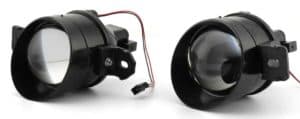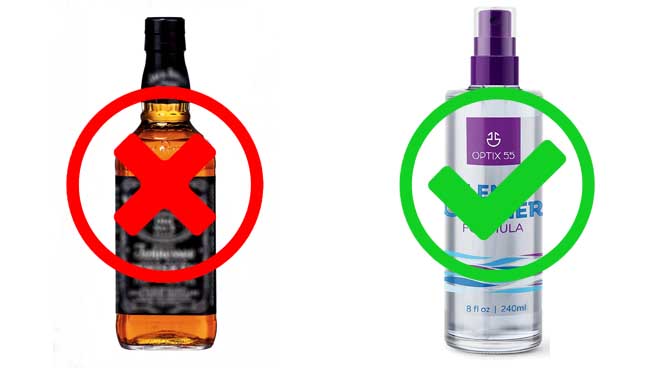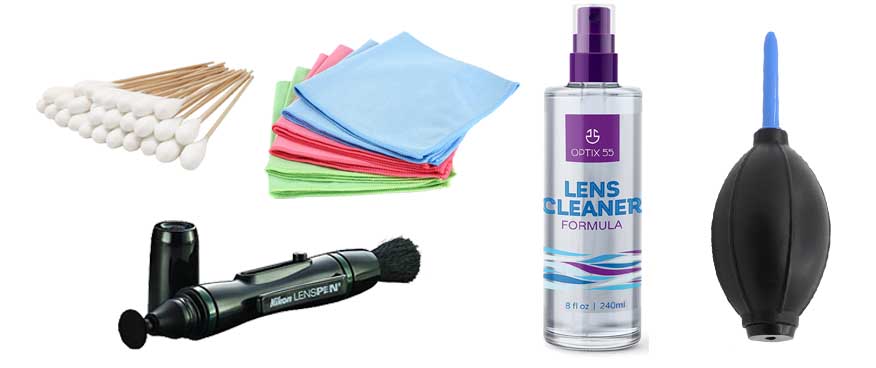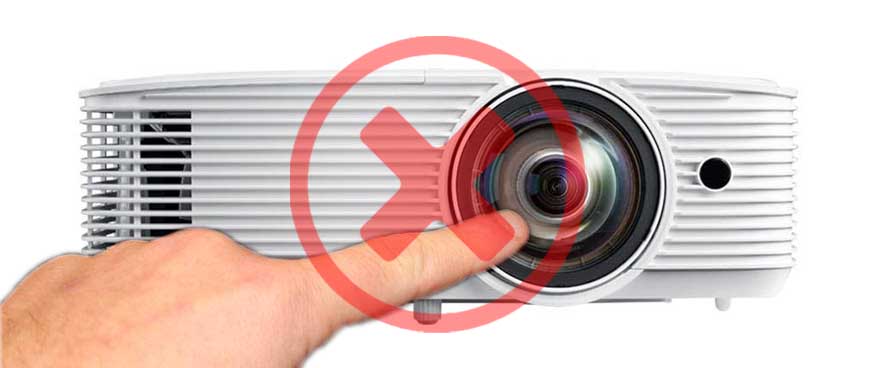 Your projector is one of the most essential tools in your office or home entertainment system.
Your projector is one of the most essential tools in your office or home entertainment system.
Like any other electronic device, it requires occasional cleaning to maintain optimal performance. In some cases, people have wondered if Can I Clean My Projector Lens With Alcohol.
The short answer is no – The glass has a variety of special coatings on it. These will be removed if you use rubbing alcohol. To remove dust, use lens cleaners or a non-canned air blower.
There are a few things you should know before you get started. Keep reading for more information on how to clean your projector lens safely.
Can I clean my projector lens with alcohol: How Do I clean the lens?
Types of projectors lenses

There are a few different types of lenses used in projectors. The most common are coated and uncoated lenses. Coated lenses have a layer of material that helps reduce glare and reflections, and uncoated lenses do not have this coating.
Other types of projector lens are:
Convex Lens: Convex Lenses are some of the most common lenses in projectors. They are the basic requirements projectors need to deliver pictures because they enlarge the projected content size. This gives one the ability to mount or place their projector anywhere they want. That’s a trait that’s pretty standard in projectors nowadays regardless of where it’s placed.
Without having this lens one would have to adjust the image by moving the projector forward and backwards until the sweet spot is found. An activity that would be frustrating.
A lens with a 1.2x zoom factor will allow the image size to be increased by 20 percent. That’s considered acceptable by most, especially if the projector is going to be used for a home entertainment system.
Short throw Lens
This might be kind of obvious but short throw lenses are typically found in short-throw (or in some cases ultra short throw) projectors.
Many people purchase short-throw projectors because they don’t have a ton of room for a 10 ft distance between their screen and their projector.
A wide-angle lens can be placed on any projector model, but it isn’t usually recommended. It’s considered an alternative if you need to move your regular projector closer to the screen but remember that the lumen rating of your projector won’t change which can result in distortion or hotspots.
Short throw lenses have shorter focal lengths, which makes a wider view field. It creates a distance between the projector and the image that is physically lackinng.
Short throw projectors can range from anywhere from 0 to 8 ft from the screen, a range that would make the image appear smaller or actually cut parts of the image off. Wide angle lens create wider frames that ensure the entire image is viewed.
Long throw Lens
On the opposite end of the spectrum we have long throw lens. According to the title, one would think that long throw is the exact opposite of short throw – that isn’t necessarily true.
When projectors can’t be positioned directly in front of the screen, having an interchangeable long throw lens would help achieve the best image quality while also working like a zoom lens. Because the projector is further away, having this lens will enhance the pictures clarity and size on the screen.
One will typically find these lenses in churches, auditoriums and anywhere that requires large audiences since the projector will be behind them. These lenses can also be used at home for anyone who needs a distance over 10 ft between their screen and projector.
Micro Lens
Micro lenses are incredibly small lenses. They typically have less than a mm diameter. Micro lenses can provide amazing picture quality and are considered a good option for digital projectors. While most projectors are compatible, some of the are not.
Because their design is so tiny, the pieces that support the actual lens inside the projector are typically thicker than the actual lens. if you try to use this lens type you’ll want to take the thickness into consideration and make sure it’ll fit.
You’ll also want to take into account if it’s a sophisticated aspherical surface or a spherical convex surface.
Micro lenses with spherical convex surfaces means the lens itself has a single layer that collects and send light to your screen in a focused manner.
Aspherical micro lenses have multiple layers and might be a bit thicker. The layers of the lens work together to clear the image up.
Projectors also have a Micro Lens Array feature. Micro lens and this featured are used synchronously to redirect light that would be lost through out of the lens and through the prism.
By doing so you can increase your picture’s brightness more while also lowering the heat made inside the projector.
Answer to the question
Rubbing alcohol will damage the coatings on your lens, and it is not recommended to use rubbing alcohol to clean any type of projector lens. If you must use something, diluted vinegar or distilled water is better.
What can I use to clean my projector lens?

You should never clean your projector lens with alcohol. The glass has a variety of special coatings on it, and rubbing alcohol will remove these coatings. This can lead to a decrease in image quality.
You can use lens cleaners eor a non-canned air blower to remove dust. If you need to deep clean your projector lens, you can consult the manual for instructions on how to do so.
In general, it’s best to avoid cleaning your projector lens unless absolutely necessary. If you need to clean it, make sure you use the proper methods and materials to avoid damaging the lens.
How to Clean a Projector Lens?
To clean a projector lens, You’ll need a variety of tools and methods to completely clean a projector lens. Depending on how dirty your lens is and what contaminants it has picked up, you may not need to use every cleaning procedure every time.
You’ll need to purchase a lens cleaner or use a non-canned air blower. You should never use rubbing alcohol, as this will remove the special coatings on the glass.
Materials needed to clean your projector lens
- Lint-free cloth
- Lens cleaning solution
- Manual lens blower
- Lens pen or lens brush
- Lens cleaning paper

Steps to cleaning projector Lens
First, power off the projector and unplug it from the wall. Then, follow these steps:
- To remove dust from the lens, use a hand lens blower. Hold the blower about two to five inches away from the lens and use moderate pressure. (Never use compressed air.)
- If you need to remove fingerprints or smudges, use a lens cleaner explicitly designed for cleaning optics. Apply the solution to a clean microfiber cloth and wipe the lens in a circular motion.
- Use a special lens brush to remove any particles stuck to the lens. Gently brush the lens in a circular motion.
- If the lens is still dirty, you can use a cotton swab dipped in distilled water to remove stubborn stains. Gently wipe the lens in a circular motion.
(Spray the cleaner on a tissue instead of directly on your lens.)
- Once you’ve finished cleaning the lens, use a dry microfiber cloth to remove any residual moisture.
You can safely clean your projector lens without damaging it by following these steps. Remember to use the proper tools and solutions and avoid rubbing alcohol.
How do I protect my projector lens?

It is essential to keep your projector lens clean to get the best possible image quality. You can do a few things to keep your lens clean and extend its life.
The first thing you should do is avoid touching the lens with your fingers. The oils from your skin can damage the coatings on the lens. If you must touch the lens, follow the cleaning instructions on top.
Another thing you can do is to keep dust and other particles away from the lens. These can scratch the surface of the lens and cause image quality problems. You can use a non-canned air blower to remove dust from the lens.
If you need to use a cleaner, make sure you choose one designed specifically for cleaning projector lenses.
Finally, you should store your projector in a clean, dry place when it is not in use. This will help to keep dust and other contaminants away from the lens.
By following these simple tips, you can keep your projector lens clean and extend its life.
Can I clean the inside of a lens?
No, you should not clean the inside of a lens. The interior of the lens is coated with a special anti-reflective coating.
If this coating is damaged, it can cause image quality problems. If you need to clean the inside of the lens, contact your projector manufacturer.
However, if you want to clean the projector lens inside, watch this video.
How can I tell if my projector lens is dirty?
One way to tell if your projector lens is dirty is to look at the image quality. If the image is fuzzy or has reduced contrast, it may be time to clean the lens.
Another way to tell if the lens is dirty is to look for dust or other contaminants on the surface of the lens. If you see any, it is time to clean the lens.
Can I clean my projector lens with alcohol: Conclusion paragraph
Cleaning your projector regularly will help to ensure that it continues to function correctly and provide the best possible viewing experience. We’ve outlined the proper way to clean your projector lens.
We hope you find this information helpful and that it enables you to keep your projector in good working order for years to come. Have you cleaned your projector lens recently? If not, follow these steps before your next movie night!
How to clean my projector lens? Related FAQs
Can isopropyl alcohol damage camera lenses?
Isopropyl alcohol is not known to damage camera lenses, and in fact, it is commonly used to clean camera lenses and other optical equipment. However, it is important to use a clean, lint-free cloth when cleaning any optical surface.
Can ethanol be used as a lens cleaner?
No, ethanol is not recommended for cleaning lenses. Ethanol can damage some lens coatings and is not as effective at removing fingerprints and other contaminants as other lens cleaning solutions.
Why does my projector have a dark spot?
If you have a dark spot in the image projected by your projector, something is likely obstructing the path of light inside the projector. You will need to take the projector apart and clean the optics to fix this.
How often should you clean your projector?
You should clean your projector every three to four months, or more often if used frequently. Dust buildup can cause fan failure and other problems.
